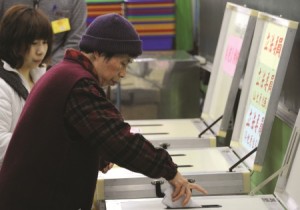Supporters of Democratic Progressive Party (DPP) presidential candidate Tsai Ing-wen cheer at the party’s election headquarters in Penchiao district, New Taipei City on January 14.
Taiwan is a young democracy with its first direct presidential elections in 1996. The two major political parties have different understandings of Taiwan’s relationship to China. The Kuomintang (KMT) or Chinese Nationalist Party has among its roots the retreat from China and “invasion” of Taiwan after Chiang Kai-shek lost the civil war to the forces of Mao Zedong and the Communist Party. The younger Democratic Progressive Party, which came into existence as an opposition to KMT, has roots in Taiwanese history, language and culture, and promotes independence.
Chiang brought with him not only two million people and much of the heritage and gold of China but an authoritarian legacy that has been hard to leave behind.
China calls Taiwan a rogue province and China’s economic and political power has led to a lack of support for Taiwan among the world community, including Canada.
The Jan. 14 election did not include the threat of rockets from China but more subtle economic and political pressure that indicated China’s preference for the KMT; there were warnings that electing the opposition would spell economic hardship for the Taiwanese. The United States in the last days of the election also spoke ‘unofficially’ in support of the KMT and President Ying-jeou Ma.
I was among 21 observers from eight countries operating under the auspices of the International Committee for Fair Elections in Taiwan. The team’s six Canadians included academics, politicians and church leaders.
As international observers of the elections, our task was to maintain strict impartiality as to the parties and people running for office and to carefully observe and comment on the freedom and fairness of the elections. To do this we visited campaign offices in five cities, observed candidates “sweeping” for votes on the street, and along with tens of thousands of Taiwanese, we attended the final presidential rallies. We observed the voting and counting processes and were present at the Central Election Commission headquarters as the vote totals arrived electronically from around the country.
We saw no obvious vote buying, although some instances have since been reported to the judiciary. Perhaps significant was the role of Taiwanese workers flown from (and possibly subsidized by) China. And, in the last days of the campaign, Taiwanese industrialists with plants in China urged support for the KMT.

While charges of fraud and corruption are often made, the judiciary itself is not altogether trusted; it has been regularly accused of being biased and corrupt, even insular and inscrutable.
It is clear that the majority of people in the south were disappointed in the election results while those in the north—or at least in the economic capital Taipei—were optimistic about the return of the KMT and President Ma to a second term.
As I questioned people after the election they indicated that the risk of China ‘buying Taiwan’ was minimal. Besides, they could always vote out the government. I silently wondered if the people of Tibet, the Uyghurs of Xinjiang or even the people of Hong Kong or the ‘mainland’ think it would be that easy.
Although there has been improvement in the Taiwan elections processes it appeared to those of us who were international observers that the elections were mostly free but not entirely fair.
About Ted Sivern
Rev. Ted Sivern's travelogue of Taiwan appeared in January 2010.

